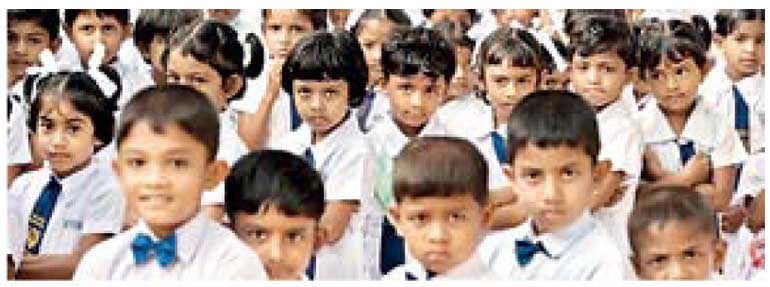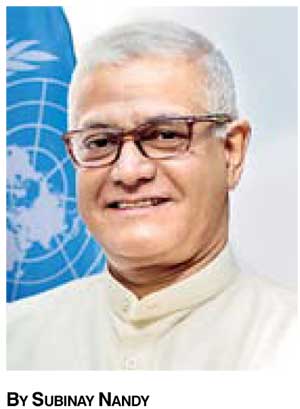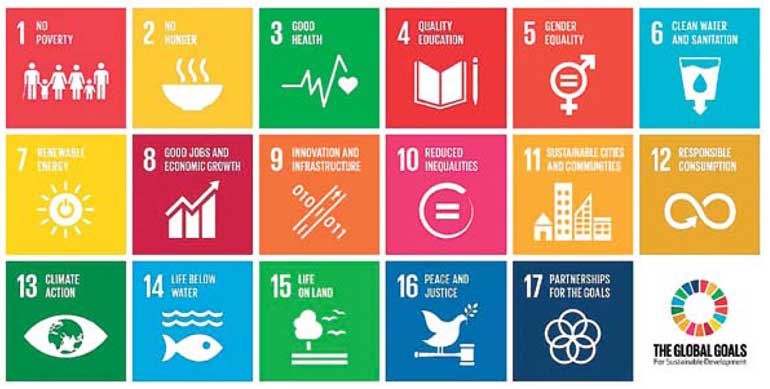Sunday Feb 15, 2026
Sunday Feb 15, 2026
Tuesday, 22 September 2015 00:01 - - {{hitsCtrl.values.hits}}
By Subinay Nandy
On 25 September, world leaders will meet at the Sustainable Development Summit 2015 in New York. This milestone high-level plenary meeting of the 66th UN General Assembly from 25 to 27 September will adopt the post-2015 development agenda, the Sustainable Development Goals (SDGs).
Designed through two years of extensive global, regional and national consultations, the SDGs will inform the development path of the Global Community post-2015. The SDGs will replace the MDGs and whilst seeking to expand the ambitions of the MDG goals (poverty, food security, health, education and gender equality) will also strengthen the agenda especially pertaining to environmental sustainability and governance.

With regard to education, Sri Lanka now boasts of a primary education enrolment rate of 99% and equal numbers of boys and girls in school
The 17 SDGs provide a framework which encapsulates the dignity of people, their role in sustainable development, justice, prosperity, and global solidarity for sustainable development. The UN Secretary-General Ban Ki-moon in reference to the SDGs stated that “they encompass a universal, transformative and integrated agenda that heralds an historic turning point for our world.”
The SDGs envision placing people and the planet on a sustainable path by 2030. As such, the overarching framework of the SDGs rests on economic progress underlined by strong environmental safeguards held together by the glue of ‘peaceful and inclusive societies for sustainable development’.
The MDG Country Report 2014 jointly launched by the UN and Government of Sri Lanka in March this year documents the remarkable progress made by Sri Lanka in achieving the MDG targets. Sri Lanka can be proud of having halved poverty seven years before the 2015 deadline.
"The MDG Country Report 2014 jointly launched by the UN and Government of Sri Lanka in March this year documents the remarkable progress made by Sri Lanka in achieving the MDG targets"
With regard to education, Sri Lanka now boasts of a primary education enrolment rate of 99% and equal numbers of boys and girls in school. On the health front, Sri Lanka has been able to reduce the infant (under one year and under five years) mortality rates, maternal mortality rates per 100,000 live births from close to 100 in 1990 to 33 in 2010, whilst ensuring that 99.8% of births take place in the presence of skilled health workers.
Sri Lanka remains one of the few countries in the region with low levels of HIV prevalence with less than 0.01% of the population infected. Furthermore, the proportion of the population with access to safe drinking water and access to basic sanitation has increased to almost 90%.
Whilst celebrating these achievements, the MDG Report also outlines the remaining challenges confronting Sri Lanka and identifies some priority areas for the country’s post-2015 development agenda. Among these, the quality and relevance of education, decent employment, continuing poverty and vulnerability in lagging areas and environmental pollution and exploitation of natural resources are some of the gaps highlighted.
"Goal 16 of the Sustainable Development Goals is of particular relevance to Sri Lanka as it refers to the need to promote peaceful and inclusive societies for sustainable development, provide access to justice for all, and build effective, accountable and inclusive institutions at all levels. Sri Lanka is at a historical juncture. The Government and the people of Sri Lanka have both expressed commitment to deepen democracy and develop mechanisms to achieve reconciliation and durable peace"
The Sustainable Development Goals are wide-ranging incorporating MDG-like targets into a broader agenda of equality, rights-based approaches and safeguards for both people and the planet. They place a greater focus on environmental issues together with specific goals on inclusivity, women’s empowerment, peace and democratic governance.
Significantly, many of Sri Lanka’s stated development priorities are well reflected in the SDGs. The need for growth with social justice, a longer term, sustained and multi-sectoral approach to tackling malnutrition, addressing persistent regional disparities in  educational and health outcomes, tackling issues relating to climate change and the adverse impacts of unpredictable weather patterns, low levels of women’s political engagement and participation in the formal labour market, the need to introduce public service reforms to ensure stronger social protection that does not overburden the government and strengthen the legal and institutional framework for upholding the rule of law and protection of human rights are all priorities in the country’s development pathway.
educational and health outcomes, tackling issues relating to climate change and the adverse impacts of unpredictable weather patterns, low levels of women’s political engagement and participation in the formal labour market, the need to introduce public service reforms to ensure stronger social protection that does not overburden the government and strengthen the legal and institutional framework for upholding the rule of law and protection of human rights are all priorities in the country’s development pathway.
Goal 16 of the Sustainable Development Goals is of particular relevance to Sri Lanka as it refers to the need to promote peaceful and inclusive societies for sustainable development, provide access to justice for all, and build effective, accountable and inclusive institutions at all levels.
Sri Lanka is at a historical juncture. The Government and the people of Sri Lanka have both expressed commitment to deepen democracy and develop mechanisms to achieve reconciliation and durable peace.
The democratic political transition that is taking place through broad participation in the electoral process and the engagement with the Geneva process, both contribute towards a solid platform for sustainable peace, and symbolise the commitment to uphold the rule of law and human rights of all peoples of Sri Lanka.
The United Nations will continue to partner with Sri Lanka as the country progresses towards enhanced sustainable development, resilience, democratic governance and protection of human rights. Our journey with Sri Lanka commenced 60 years ago when Sri Lanka became a member state of the United Nations in 1955.
For much of the 70-year history of the United Nations, Sri Lanka has been an engaged partner of the UN system and supported its work through notable contributions from its professionals to the organisation as well as global policy development and thought-leadership in diverse areas, ranging from the law of the sea to disarmament, children in armed conflict, housing policies and climate change.
As such, our partnership has been a mutually-beneficial and reinforcing one which has affirmed the common values and the shared vision that unites Sri Lanka and the United Nations System in supporting the people of Sri Lanka in their journey towards peace, progress and prosperity.
(Author is the Resident Coordinator of the United Nations and Resident Representative of the United Nations Development Programme in Sri Lanka.)
